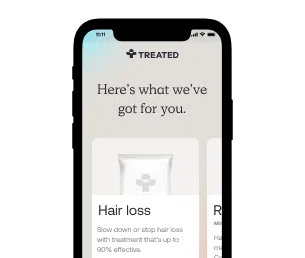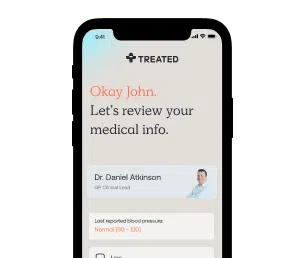Threadworms
Tablets and liquids for parasitic infections.
Secure delivery
UK clinicians
Threadworms are a type of parasite which can live in the lower intestines. They’re very contagious and can cause itching around the anus or vagina.
Answer a few questions about your health, and get recommendations for treatment from our experts. Order threadworm treatment online and get it delivered from our pharmacy.
Threadworms, also known as pinworms, belong to a group of parasites called roundworms. They use the human body to survive and reproduce, and live in the large intestine for up to six weeks.
The side effects caused by threadworms are caused when the female exits the anus each night to lay eggs. This is what causes the itching sensation around the bottom. Once the eggs hatch more worms are produced and the infection cycle continues. These worms can live outside of the body for up to two weeks which makes the risk of transmission very high if treatment is not immediately sought.
Threadworms are extremely contagious. Its eggs can be transferred through surfaces that are likely to come into contact with people. Regular washing of these surfaces and cleaning under your fingernails can help to stop the spread of this infection.
Threadworm infections are more common amongst children under the age of 10. However, it can be picked up by anyone. It’s believed that children pick up the infection easier due to their reduced hygiene awareness. The fact that toys and equipment are shared in childcare facilities also contributes to them being more prone to infection.
When one person in a household gets a threadworm there is a strong possibility that everyone else in the house will get it too. It’s for this reason that we recommend whole families receive treatment at the same time and not just the person who has contracted it.
Threadworms are one of the most common parasitic worm infestations. It’s not something that you should worry about though. Symptoms are rarely severe, they’re just irritating. Treating this parasite is also very easy. If you have any questions about how to treat it then have a chat with our clinician for further information.

How we source info.
When we present you with stats, data, opinion or a consensus, we’ll tell you where this came from. And we’ll only present data as clinically reliable if it’s come from a reputable source, such as a state or government-funded health body, a peer-reviewed medical journal, or a recognised analytics or data body. Read more in our editorial policy.
Threadworms are spread when their eggs are ingested. This commonly happens when the eggs get under your fingernails from surfaces or food and are then swallowed. Once swallowed, these eggs will then hatch in the large intestine. The newly hatched worms will then grow into adults which lay their own eggs and the whole cycle starts again.
At night, female threadworms exit the anus to lay eggs around it. Because this causes itching, people tend to scratch their bottom, which gets the eggs under their fingernails. These people then spread the eggs when they touch other surfaces. The eggs can live for up to two weeks outside the body, so the risk of infection is very high.
If you have threadworms you’ll usually be able to see them in your stools or on your bedsheets. The worms look like a thin, white thread and are around one centimetre in length. They tend to cause itching around the vagina or anus, particularly at night. This itchiness can wake you up. Less common symptoms can include bed-wetting, weight loss and irritated skin around the anus or vagina.
It’s rare that threadworms lead to any serious problems. The main ones you’ll notice are irritated skin around the anus from frequent scratching or sleep problems if the itching regularly wakes you up during the night.
Even though this might not sound severe, it’s still important that you get treatment for your threadworms as soon as they are diagnosed. This minimises the risk of the worm spreading to other people. Treating threadworm early also lessens the risk of it spreading to other areas of the body and causing diseases. Although this risk is rare, it is still worth mitigating.

How we source info.
When we present you with stats, data, opinion or a consensus, we’ll tell you where this came from. And we’ll only present data as clinically reliable if it’s come from a reputable source, such as a state or government-funded health body, a peer-reviewed medical journal, or a recognised analytics or data body. Read more in our editorial policy.

How we source info.
When we present you with stats, data, opinion or a consensus, we’ll tell you where this came from. And we’ll only present data as clinically reliable if it’s come from a reputable source, such as a state or government-funded health body, a peer-reviewed medical journal, or a recognised analytics or data body. Read more in our editorial policy.
Have something specific you want to know? Search our info below, or ask our experts a question if you can’t find what you’re looking for.

Registered with GMC (No. 4624794)
Meet Daniel
Registered with GPhC (No. 2202465)
Meet Sanjeda
Registered with GPhC (No. 2070724)
Meet Craig
Always read the leaflet that comes with your medication and tell us about any side effects you get.
We know health, but you know you.
Our experts tell you what’s safe, but you decide what’s best.
Answer a few questions and tell us about yourself. Get tailored advice from our clinicians so you can choose better.

Choose your treatment and how often you have it delivered.

We know things change. It’s the nature of life. We’ll check in regularly to make sure your treatment is still right for you.
Pause. Change. Skip. Start again. Any time you like.
Here are some other things we can help with.
Choose from our range of tablets and solutions. Get ongoing care and support from our experts.
Stop smoking treatments that can help you kick the habit forever, and reduce your risk of disease.
Tablets or injections. Tailored weight loss treatments combined with ongoing support from our experts.
We're making healthcare more about you. Sign up to our newsletter for personalised health articles that make a difference.
Disclaimer: The information provided on this page is not a substitute for professional medical advice, diagnosis, or treatment. If you have any questions or concerns about your health, please talk to a doctor.
We couldn't find what you're looking for.
Here's everything we treat. Or, if you're looking for something we don't have yet, you can suggest something.
If there’s a particular treatment or condition you’re looking for, tell us and we’ll look into it for you.
Submit your question here, or tell us if you’ve found an issue on our site.
We’ll get back to you very soon. We aim to respond to all queries in one working day.
You’re signed up to our newsletter. Keep an eye on your inbox for our latest update.
By clicking 'Subscribe now' you're agreeing to our Privacy Policy.
We’ve sent you an email asking you to confirm your email address.